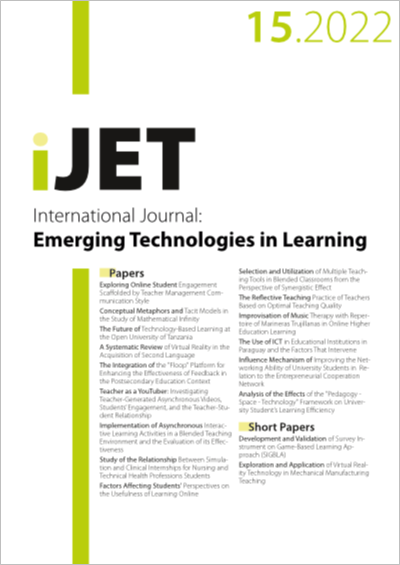Development and Validation of Survey Instrument on Game-Based Learning Approach (SIGBLA)
DOI:
https://doi.org/10.3991/ijet.v17i15.33267Keywords:
game-based learning, digital games, assessment instrument, technology, learning, reliabilityAbstract
The purpose of this study was to develop and psychometrically evaluate an in-strument that analyses technology game-based learning holistically across a num-ber of critical characteristics. On the other hand, qualitative feedback is difficult to collect in the absence of a quality rating method. There is an urgent need for a comprehensive scale that has been psychometrically validated and is suited for assessing game-based learning knowledge, perceptions, and attitudes. The ap-proach for developing and validating these new scales followed current best prac-tices for scale development and validation. As a result, a mixed-methods design was used, which comprised the establishment of an item pool, expert review, a questionnaire pilot study, exploratory factor analysis (N = 174 and N = 284), and parallel analysis. The Survey Instrument on Game-Based Learning Approach (SIGBLA), an instrument for assessing knowledge perception and attitudes to-wards game-based learning, has been developed. It comprises of three subscales. The SIGBLA was determined to have exhibited content validity, dependability, and internal consistency. The tools were developed and validated using data from assessments of a number of educational games. This method is adaptable to a wide variety of instructional digital games and can be used to ascertain which components of a game contribute to users' knowledge, perceptions, and attitudes. Additionally, it is relevant to a variety of other sorts of digital games used in the educational sector. As a result, the SIGBLA may be used to characterize the psy-chometric properties of various types of digital games played by various sorts of users. Students demonstrated good knowledge and positive attitude towards game-based learning. In order to develop positive impressions, knowledge, and attitudes among students, educational games must be implemented in the class-room. Educational games can be used to improve cognitive knowledge and foster favorable attitudes toward the subject.
Downloads
Published
How to Cite
Issue
Section
License
Copyright (c) 2022 Joana De Guzman Quinto

This work is licensed under a Creative Commons Attribution 4.0 International License.



